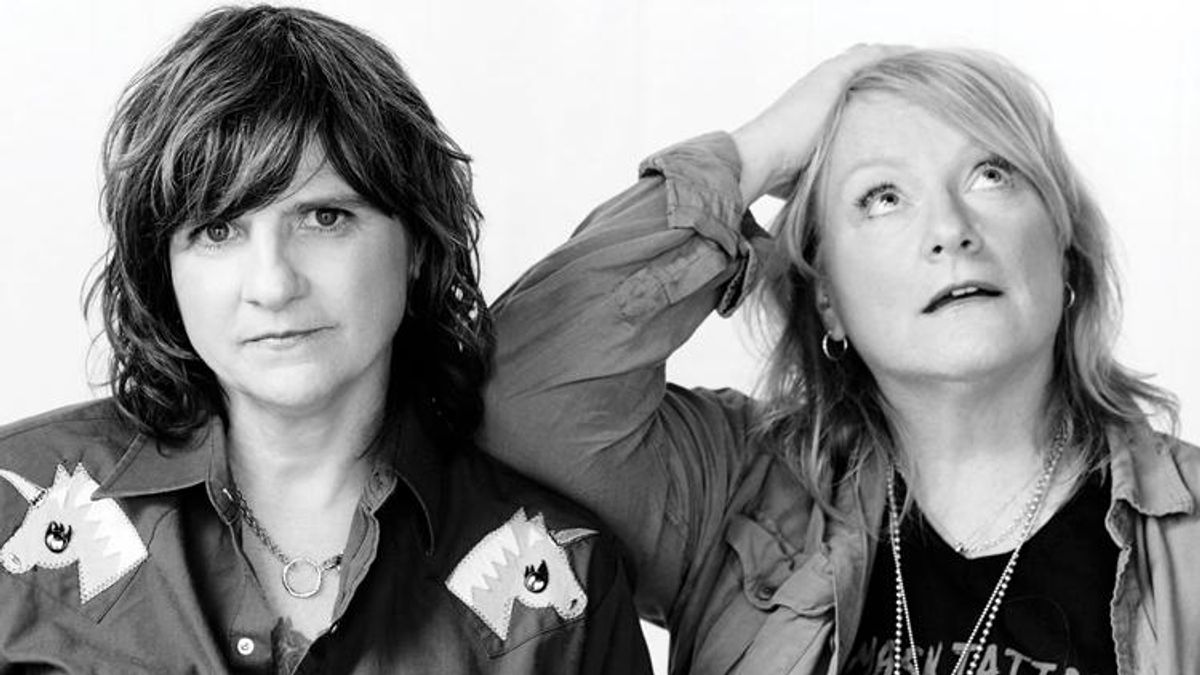"Music is a galvanizing force," the Indigo Girls' Emily Saliers says about the power of song to create communal experiences and inspire activism. Certainly, for many who've ever experienced an Indigo Girls show with the audience belting along to classics "Galileo," "The Power of Two," and the ultimate sing-along, "Closer to Fine," the vibe is nothing short of a revival, and one that centers queer women. The Indigo Girls -- Saliers and Amy Ray -- have been a part of queer consciousness for 35+ years now, with a through line from queer and women musicians who came before them like Cris Williamson, Holly Near, and Joan Armatrading to the next generation that includes Brandi Carlile and Janelle Monae. When asked to name their earliest queer women inspirations, there's one they emphatically cite: Ferron.
A lesbian musician from Canada, Ferron began to rock the music scene in the late 1970s with her 1977 self-titled album. Her records Testimony (1980) and Shadows on a Dime (1984) became staples of the queer women's canon.

Early on, Ray says she was inspired by male musicians like Elton John and Gregg Allman before discovering the rocker and poet Patti Smith.
"Patti Smith clicked a little bit in my head of like, OK, she's so contrary. You never really know where she's coming from. She's like, pure art, because [she] forces you to confront things inside yourself, because you're not quite sure where she's coming from."
Ray also nods to queer punk groups like The Butchies and Team Dresch as hugely important to her later on.
"I listened to groups that were not only talking about women's music and stuff but [also] were talking about gender identity and fluidity and really opening my eyes up to just being what you want to be. Punk rock really did that in a bigger way than anything else had for me," Ray says.
But it was Ferron's music that first touched Ray on another level of identification.
"Someone who I just really had to kind of think Where am I? Who am I? was Ferron," Ray says. "Here's my person, you know, and I can directly relate to the lyrics. And it's like, my story -- that kind of feeling."
Meanwhile, Saliers cites the rock band Heart as women in music who resonated with her early on. Later, she discovered Joni Mitchell.
"Joni, she was more like a songwriting Renaissance woman -- artistic inspiration for me," Saliers says. She names Williamson's album The Changer and the Changed from Olivia Records, the premier label for what was then called "women's music," as critical to her early knowledge of how music and identity could collide.
"[But] the queen of the queen was Ferron. One of the greatest songwriters in American history. Amy and I totally latched on to her songwriting and her singing," Saliers says. "She just blew our minds...I learned her songs on guitar, and I just lived through her music."
The duo later went on to find great community at the Michigan Womyn's Music Festival, which ran from 1976 to 2015, a seminal experience for so many lesbians that ended amid controversy over the organizers' refusal to allow trans women on the land.
"[Michigan] Womyn's Fest, that turned our heads quite a bit," Ray says. Meanwhile, Saliers recalls an openness at Michfest that was freeing. Ultimately, they stopped playing there over the trans women issue.
"That community is so important to me," Ray says. "I think it hurt people's feelings when we were like, 'We can't play this festival if you can't let trans women in.'"
Ray and Saliers have spoken openly about their struggles with internalized homophobia before they came out in the early 1990s zeitgeist when k.d. lang and Melissa Etheridge were making waves as successful musicians who were also out lesbians. But Ray and Saliers weren't cognizant of being a part of history when they came out.
"You sort of see them as comrades [Etheridge, lang, and Ani DiFranco] -- women in solidarity," Saliers says. "I don't think that I was ever struck with a worrying and historical moment here. Because I think I was dealing with my own feelings of self-homophobia."

In late July, Carlile, who's been out since the beginning of her career, graced the stage at the Newport Folk Festival, where she helped usher Mitchell back to that stage after 53 years. The Indigo Girls have played several gigs with Carlile, and Saliers notes her influence as a lesbian who's creating a broader community. But she still sees a chasm or an othering when it comes to the term "women's music."
"Women, queer artists, like Brandi Carlile, who's just exploded. What she does for queer people is so amazing being out with Cath [Carlile's wife, Catherine Shepherd] and with her family and with the fans," Saliers says. "There's still, I think, always going to be a distance between lesbian or queer women singers and a massive, massive audience, because I think it boils down to sexism and homophobia."
From the critical influence of Olivia Records to DiFranco (who was proudly out in her bisexuality) and her Righteous Babe label to Grammy winner Carlile, who's collaborated with country superstars like Tanya Tucker and Wynonna Judd, "women's music" has evolved. But the future is one without labels, Saliers says, citing Monae as a leader.
"Janelle [is someone] where you don't go, Oh, they're that or whatever. They just come through with all their humanity without labels, and that makes me happiest of all," Saliers says. "We've been so fucking caught up in the binary. There's so much of life that just does not fit into that box. [Monae] just breaks the box wide open...no labels."
This story is part of The Advocate's 2022 History issue, which is out on newsstands August 30. To get your own copy directly, support queer media and subscribe -- or download yours for Amazon, Kindle, Nook, or Apple News.





















































































Fans thirsting over Chris Colfer's sexy new muscles for Coachella